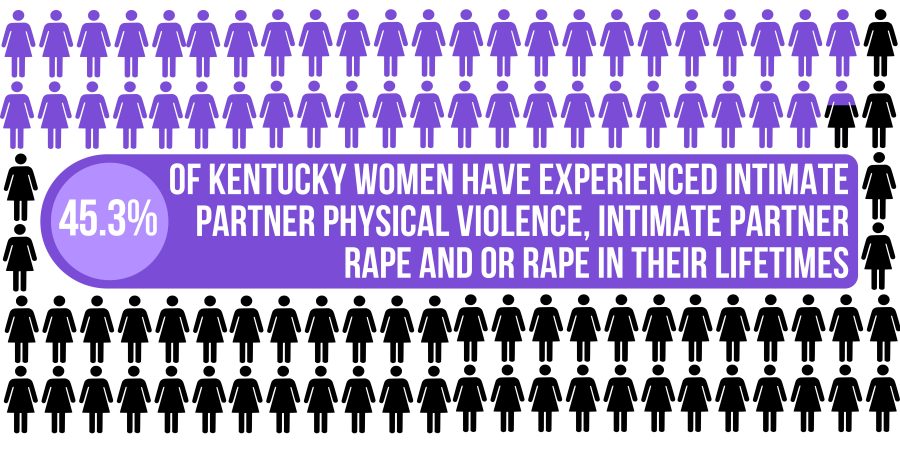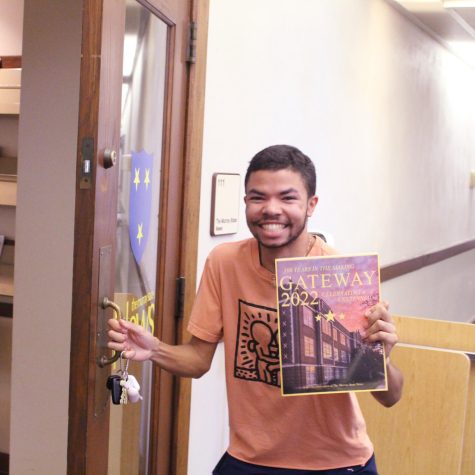Gender Equity Caucus highlights violence toward women in campus community
After an act of violence toward women on campus on Sept. 10 the GEC published a statement on Sept. 13 standing in solidarity with the women attacked (Source: ncadv.org). (Dionte Berry/The News)
September 28, 2022
Gender-based violence and intimate partner violence have been thrust into the spotlight after an act of violence toward women has affected the Murray State community, garnering a response from the Gender Equity Caucus.
Murray State student Jack Epperson allegedly attempted an attack on female students gathered outside of Sorority Row for Lambda Chi Alpha’s Watermelon Bust on Sept. 10. Epperson attempted attacking the students with a Molotov cocktail-style weapon and then a knife.
None of the students were physically injured, but the GEC made note of the mental scars the attack could leave on those affected. The GEC published a statement on Sept. 13 sharing what happened on Sept. 10, extending solidarity to those affected and highlighting the recent violence against women in the Murray State community.
The Nation Coalition Against Domestic Violence reported in 2020 that around 45% of Kentucky women have experienced domestic abuse or rape from an intimate partner.
The GEC recalls past instances of gender-based violence that have affected campus, but also calls for better clarity when campus is alerted of these occurrences.
“Greater transparency beyond meeting minimal reporting requirements and concrete actions to address the needs of vulnerable populations are essential for combating violence already shrouded in silence, secrecy and shame,” the statement reads.
Assistant Philosophy Professor and GEC member Michelle Panchuk played a role in drafting the statement.
“Myself and some of the other members of the GEC were together when we saw the original update, but we didn’t know what it was about, of course, and when we read The Murray Ledger & Times,” Panchuk said. “Immediately the attack stood out to me as a case of violence against women, at least from the testimony of other students.”
Panchuk noted that this form of violence is not something for which everyone is equally at risk. Gender-based violence occurs based on one’s gender, sexuality or race.
Fellow GEC member and Associate History Professor Christine Lidner said highlighting violence against women has been on the GEC’s radar for the last few years.
Members organized a vigil in April 2021 for women who were victims of gender-based violence. Lidner said they also had a committee work on sexual assault and violence last year that included developing a questionnaire about incidences of harassment and assault by faculty or experienced by faculty on campus.
Along with the published statement, Lidner spotlights the past incidents of violence against women that have occurred in the Murray State community.
The GEC statement highlights the murder of Sarah Townsend in March 2021 and the upswing of campus assault rates during September 2021 as recent examples of violence toward women.
Lidner also cites the alleged murder suicide in March 2021 as an example of violence toward women that affected campus.
Regarding the incident, police said 31-year-old Anthony Amoroso shot his girlfriend, 46-year-old Katherine Bryan, and a child before turning the gun on himself.
“She was not a community member of Murray State, but she lived in a house right next to the dorms…a number of my students heard the gunshots,” Lidner said. “It was not a campus incident, but it still affected our community.”
Regarding the reporting on these incidents, Lidner would like to see more transparency.
“From my understanding from talking to students and everybody else, people were freaked out that there was a lack of clarity over what happened,” Lidner said. “People just had to know. I think there is a fine line between raising an alarm that scares more people or might be activating people versus keeping people informed.”
Beyond transparency, Lidner points out the weight placed on faculty when it comes to helping students through these incidents.
“On top of normal trauma, there’s a high rate of domestic intimate partner violence, homophobia and gender-based violence, I come into each class, recognizing the weight of those layers of trauma [in students],” Lidner said. “I am not a counselor. I can listen, but I’m not trained to be the therapist, but I’m very happy to say, ‘This sounds like something that you should go to the Counseling Center [for].’”
Lidner said she would like to see a support network for faculty, when it comes to listening to their students’ trauma as well as coping with their own.
Along with advocating for more transparency, GEC President Sara Cooper said the statement serves to name what happened as an act of violence toward women, rather than have it be seen as an isolated act.
“We felt it was important to name the incident as an instance of violence against women since, as far as we knew, that had not yet happened,” Cooper said. “This is especially important because the response to gender-based violence is so often silence.”
Along with gender-based violence being a focus of the GEC, Cooper said they have also made strides to ensure the campus remains aware of this violence.
In 2021, the GEC held a Sexual Assault Awareness Fair along with a panel highlighting the violence that Indigenous women face.
Cooper said they plan to continue to host awareness-raising events this year to get involved in efforts to support early intervention in cases where warning signs of violence and abuse are reported.
“It is important to all of us that the response does not stop at a statement, but rather that a statement is a part of ongoing work toward equity,” Cooper said.
The GEC’s statement highlights that they will continue supporting the work done by Murray State’s Sexual Assault Response Team and partnering with survivors, allies and advocates to develop a safer environment on campus.
The GEC is working toward circulating the statement, and it has been endorsed by the English and Philosophy Department.
“We’re hoping that other departments and entities at the University will endorse it and adopt similar language to share on their social media and university websites,” Panchuk said.





























































































